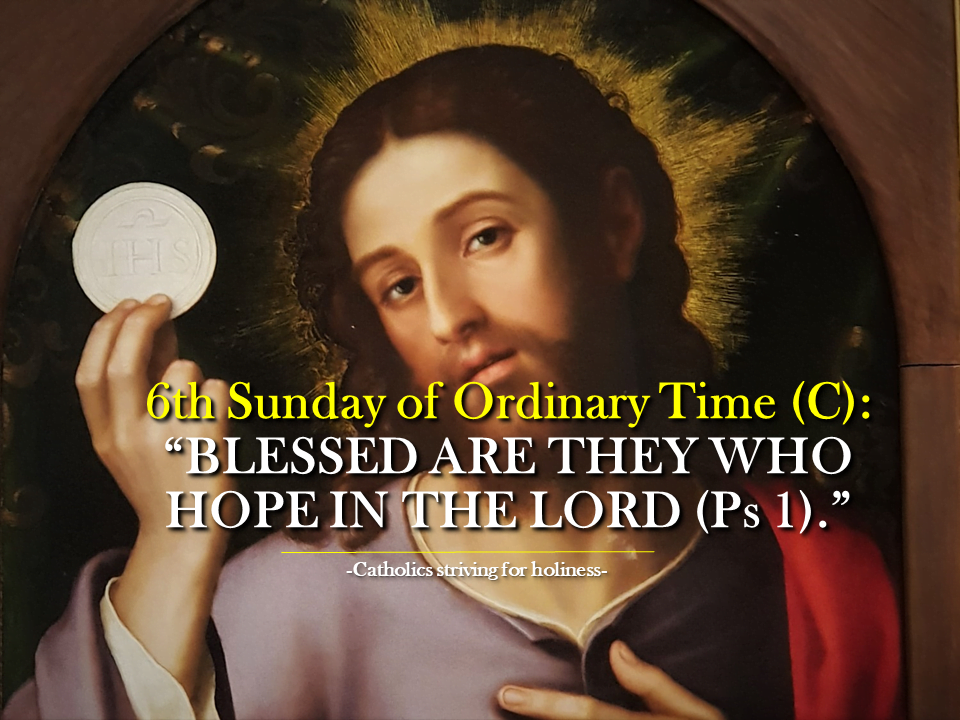Homily 6th Sunday in Ordinary Time C
“BLESSED ARE THEY WHO HOPE IN THE LORD
(Psalm 1).”
OUTLINE
- Summary of ideas of today’s readings
- A Christian puts his trust and hope in God.
- The way that leads to everlasting life is Christ by living the Beatitudes.
1. Summary of ideas of today’s readings
In whom do we place our trust and our hope? In ourselves, in our strength, in money and material goods? (see 1st reading and Gospel).
- “Blessed is the one who trusts in the Lord, whose hope is the Lord. He is like a tree planted beside the waters that stretches out its roots to the stream: it fears not the heat when it comes; its leaves stay green; in the year of drought it shows no distress, but still bears fruit.” (1st reading, Jer 17:5–8)
- “Blessed is the man who hope in the Lord (Responsorial Psalm)”
- “Blessed are the poor, for yours is the kingdom of God. […] Woe to you rich people, because you already have your consolation! (Gospel: Lk 6:17, 20–26).”
2. A Christian puts his trust and hope in God.
Being a Christian means trusting God above all else, living evangelical poverty. This does not mean that material goods are evil. Rather, a Christian should not see in them his absolute end but rather means to live a decent and sober life, vigilant of not being attached to worldly goods and in putting them to use to help those who are in need.
- In practice, this translates into putting our heart in God first and when we really do so, we could not ignore the needs of those who are indigent and suffering, which is the thermometer of our love for God. Love for one’s neighbor begins with those people around us, showing them our mercy, understanding, patience, compassion and forgiveness….
- This, however, does not exclude the importance of being closer to the poor, those who suffer, generously sharing with them our spiritual and material goods, knowing that we cannot outdo God in generosity.
3. The way that leads to everlasting life is Christ by living the Beatitudes.
A Christian who follows Christ strives to practice Christ’s advice: daily self-abasement and denial: “If anyone wishes to come after me, let him deny himself daily, carry his cross and follow me (Mt 16:24).”
This consists in dying to ourselves and our disordered passions -which lead us to be overly attached to worldly things-, so that Christ may live in us.
Living Christ’s life supposes living the Beatitudes (cf. today’s Gospel) which are the traits of his personality and life. “Blessed are you who are poor, for the kingdom of God is yours. Blessed are you who are now hungry, for you will be satisfied. Blessed are you who are now weeping, for you will laugh. Blessed are you when people hate you, and when they exclude and insult you, and denounce your name as evil on account of the Son of Man.”
“In proclaiming the Beatitudes, Jesus asks us to follow him and to travel with him along the path of love, the path that alone leads to eternal life. It is not an easy journey, yet the Lord promises us his grace and he never abandons us. We face so many challenges in life: poverty, distress, humiliation, the struggle for justice, persecutions, the difficulty of daily conversion, the effort to remain faithful to our call to holiness, and many others. But if we open the door to Jesus and allow him to be part of our lives, if we share our joys and sorrows with him, then we will experience the peace and joy that only God, who is infinite love, can give.
The Beatitudes of Jesus are new and revolutionary. They present a model of happiness contrary to what is usually communicated by the media and by the prevailing wisdom. A worldly way of thinking finds it scandalous that God became one of us and died on a cross! According to the logic of this world, those whom Jesus proclaimed blessed are regarded as useless, “losers”. What is glorified is success at any cost, affluence, the arrogance of power and self-affirmation at the expense of others.
Jesus challenges us, young friends, to take seriously his approach to life and to decide which path is right for us and leads to true joy. This is the great challenge of faith. Jesus was not afraid to ask his disciples if they truly wanted to follow him or if they preferred to take another path (cf. Jn 6:67). Simon Peter had the courage to reply: “Lord, to whom shall we go? You have the words of eternal life” (Jn 6:68). If you too are able to say “yes” to Jesus, your lives will become both meaningful and fruitful. (Pope Francis, Message for the 29th World Youth Day).
It is the path which leads towards everlasting happiness which has already begun here on earth, that is why Our Lord said: “Blessed [happy] are you.” It is a happiness which is compatible with suffering, with persecution and difficulties, for this was what Our Lord experienced during His Life on earth.
Living the Beatitudes is Christ’s way: it is the way of the righteous which leads to True Life and Happiness. “Rejoice and be glad; your reward will be great in heaven.”
A Blessed Sunday and week ahead! Fr. Rolly Arjonillo, priest of Opus Dei.
FOR TODAY’S MASS PRAYERS AND READINGS, CLICK HERE.
Stay updated: subscribe by email for free TO OUR NEW WEBSITE www.catholicsstrivingforholiness.org (PUT YOUR EMAIL IN THE SUBSCRIBE WIDGET).
We are also in www.fb.com/Catholicsstrivingforholiness. Kindly help more people in their Christian life by liking our page and inviting your family, friends and relatives to do so as well. Thanks in advance and God bless you and your loved ones! Fr. Rolly Arjonillo
